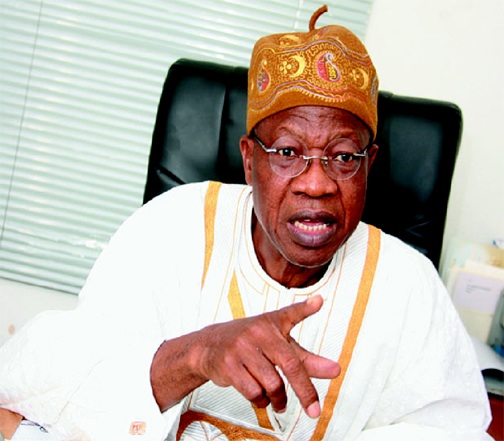Lai Mohammed explains why war against terrorism cannot be separated from anti-corruption war

The Minister of Information and Culture, Alhaji Lai Mohammed on Wednesday explained why the fight against terrorism cannot be separated from the anti-corruption war, lamenting that those who have the responsibility of providing for the anti-insurgency war Nigeria needed to quickly win chose to divert and steal what is meant for funding the war.
While observing that all the factors listed by Pillar One of the United Nations Counter Terrorism Strategy as conditions conducive for the spread of terrorism are prevalent in Nigeria, he stressed that they are a direct consequences of the plunder of public funds.
The Minister, who spoke at the dissem?i?nat?i?on workshop on Conflict Sensitive Communications and Reporting organized by the Office of the National Security Adviser, in collaboration with the Nigeria Stability and Reconciliation Programme, listed the factors to include: poverty, injustice, prolonged unresolved conflicts, lack of social mobility, alienation.
He asserted that there is no way Nigeria could have succeeded in the fight against insurgency when the military is ill equipped, ill motivated and the soldiers are not sure about their pay.
Mohammed went on to stress that the war against terrorism and corruption must be anchored on an enduring Master Narrative, pointing out that, "For both spokespersons and correspondents, a key guide to being effective is to know what narratives support and amplify our core national values.
"Our constitution, our religions, cultures, our diversity, our armed forces and law enforcement officers, our ability to rebound in the face of challenges all combine to make us a unique and great people. In the many difficult choices ahead, we must mobilise citizens in the positive direction and unleash the positive energy we need to develop our economy and live in peace and security. This is the kind of narratives we require to dismantle the infrastructure of extremism and unite against corruption.
"Beyond bullets, we must strengthen and mobilise our core national values and narratives against terrorism and corruption. Wherever you find corruption across the world, the pathway to radicalisation is widened. Terrorist misinterpret and corrupt scripture in building their narratives, which they use to convert vulnerable people to their way of thinking. We must consistently build networks of resilience against extremism. Faith groups, the media, politicians, government personnel, teachers and school boards, community based organisations all have a role to play in preventing and countering violent extremism. That is why government is working hard to put in place the institutional structures that we need to implement our national strategies against terrorism and corruption.
"In reporting terrorism and corruption however, reportage that glorifies or gives unfettered access to terrorists and corrupt networks is not supportive of our national interest. That is why correspondents should make all effort to understand the threat. Take terrorism for instance, the now decapitated Boko Haram has always been clear about its strategic objectives. Boko Haram is against democracy as a system of government, rejects the constitution, sees legislation as usurping the powers of God, kills any uniformed personnel they come across, kills Muslims and Christians and is linked to ISIS, which enslaves and promotes violence against the weak, abusing the tenets of a religion they claim to belong. Neither Boko Haram nor ISIS IS Islamic.
"That is why in reporting about them, whether as spokespersons or defence correspondents, we must endeavour to use the correct identifiers. Calling them Islamic gives them a legitimacy they so desperately desire and alienates a majority of Muslims across the world who would in turn feel branded in a negative way. Corruption too fights back, those who have abused their offices have access to a lot of cash which they may use to influence the media to cloth them either as victims or as innocents. In all these, Nigeria will rely on a patriotic media that knows and understands the threat we face while protecting the public's right to know."
Cloud Tag: What's trending
Click on a word/phrase to read more about it.
Abdul-Rasheed Na\'Allah Bursary Sobi Hill Abatemi Usman Eleja Saba Jibril Raliat Islamic Foundation Ibrahim Jawondo Saka Isau Bolaji Nagode Markaz Arabic And Islamic Training Institute, Agege KwaraLearn First Lady Kwara Polytechnic Hamidu Olowo M.Y. Abdulrahaman GAMA Olaoye B. Felix Saidu Yaro Musa Ilesha-Baruba Wasiu Onidugbe Muhammed Akanbi All Confederation Of Principals Of Secondary Schools Ibrahim Agboola Gambari Ilesha-Gwanara Rice Farmers Association Of Nigeria Samuel Adaramola Nigerian Medical Association Kayode Issa Iyabo Adisa Ibiyeye Kannike Agbarere Olatunde Olukoya TVC Female National Debate Ogidi-Oloje Oko-Erin Kwara State Governor Coronavirus Bola Sagaya Alliance For Democracy Ayegbeni Gurei Rashidi Yekini Mohammed Haruna David Adesina Opolo Global Innovation Limited Sodiya Abdulsalam A. Yusuf Abubakar Imam Usman Rifun Segun Ogunsola Aliyu Adebayo Abdulrahman Onikijipa PPS Borgu Obasanjo Kwha.gov.ng Sulu Babaita Isiaka Rebecca Olanrewaju Isaac Gbenle Abdulwahab Ololele Simon Sayomi Clement Yomi Adeboye Aishatu Ahmed Gobir Falokun-Oja Goodluck Jonathan Kuliyan Geri Shuaib Olarongbe Shettima Of Ilorin Tafida Of Ilorin Sa\'adu Salau Akorede Ebun-Olu Adegboruwa Oloye Sa\'adu Salahu Oloje Just Event Online


